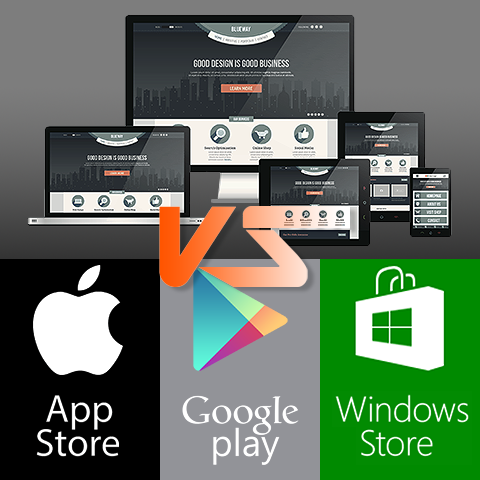Responsive Design vs Native Apps
adaptive designApp StoreGoogle PlayMobile First ApproachMobile Platform DesignMobile PlatformsNative Appsnative designresponsive designResponsive Design FrameworkResponsive Web DesignWeb DesignWindows Store

There’s been much in the media recently about the relative merits of the Responsive Design approach versus creating platform-specific Apps. Firstly, it goes without saying that a great number of Apps get their input / database feed from a master website of some description. For many companies, the best strategy would be a mix of both of the aforementioned formats. Yet here we will line up the pros and cons of each to help you figure out which overall approach may be strongest for you:
Responsive Design
PROS
- IMMEDIATE - customers can connect with you instantly
- MORE REACH - anyone can access your content, on any device, without any special preparation or significant requirements
- MORE SEAMLESS - customer is using variations of the exact same interface and exactly the same content on all devices
- MORE CONNECTED - Customer can easily switch access points and link from newsletters, emails and alerts - which don’t typically link into Apps
- MORE UNIFORM - It’s the exact same framework and content for every customer
- BETTER SEO - first Google and now the Bing search engine gives preference to mobile-optimised sites
- INSTANT UPDATES - new features, functionality and updates immediately rolled-out and available to all
- SINGLE CUSTOMER VIEW - customers and business owners alike both get singular overview interface which unifies all activities for all users
- MORE SOCIAL / MORE SHARED - all users can interact and collaborate directly - regardless of what device or platform they subscribe to
- MORE CHOICES, MORE USER INFLUENCE - customers can choose a variety of browsers and utility plugins to aid and improve experience on their own terms, versus Apps - where the device platform and developers totally control the environment
CONS
- BEST FIT APPROACH - responsive experience cannot be optimised for each device like an App can
- BROWSER VAGARIES - some municipalities, libraries and government deparments still running very old versions of Windows and IE, many customers using Privacy Tools and Ad Blockers, which can curtail and impact on specific services and total experience
Native Apps
PROS
- OPTIMAL EXPERIENCE - customer experience optimised for and on each device
- MORE CONTROL OVER ENVIRONMENT - you can assert higher functional control over how the App works and looks
- BAKED-IN FUNCTIONALITY - you can enforce specific functionality like advertising and campaigns, which customers cannot opt out of like they could with browser tools
CONS
- NOT IMMEDIATE - customer needs to download App first
- LESS OVERALL REACH - limited total access to Apps - e.g. users on Linux and minority platforms not catered for
- LESS SEAMLESS - promotional emails and newsletters do not link natively into Apps
- MORE OVERALL WORK - you need to create at least 6 separate apps for optimal coverage / experience on Mobile and Tablet across Apple, Android and Windows devices
- MORE MAINTENANCE + OVERHEADS - need to maintain multiple apps on multiple App stores - with relevant collateral and promotional and follow-up messages
- NEED ONGOING DOWNLOADS - you need to rely on your customers downloading and updating each time to latest version
- APP STORE GATEKEEPERS - you are reliant on / at risk of App Stores approving / censoring content and functionality, worst case scenario is your App could be barred / withheld - Apple does this fairly regularly with presumed competing technologies
- HARDWARE CONSIDERATIONS - unlike mobile web where you can easily update browser to latest version, you typically need several versions of an App to handle different hardware capabilities / device iterations
- FRAGMENTED TOTAL USER DATABASE - users’ activities are much more difficult to centralise and integrate when shared across numerous different App platforms
- PLATFORM VAGARIES - device platforms can institute new rules and regulations at any time which may impact on your App, new platform evolutions may make your App obsolete, or provide competing fully baked-in competing technologies which automatically have preference

Posted by Stefan Karlsson
Did you find this content useful?
Thank you for your input
Thank you for your feedback
Upcoming and Former Events
Affino Innovation Briefing 2024
St Martin's Hall, St Martins in the Field, Trafalgar Square, London WC2N 4JJ
Webinar - Introduction to Affino's Expert AI Solutions - Session #2
Zoom Webinar - Online
Webinar - Introduction to Affino's Expert AI Solutions - Session #1
Zoom Webinar - Online
PPA Independent Publisher Conference and Awards 2023
etc. venues 133 Houndsditch, London, EC3A 7BX
Meetings:
Google Meet and Zoom
Venue:
Soho House, Soho Works +
Registered Office:
55 Bathurst Mews
London, UK
W2 2SB
© Affino 2024

















